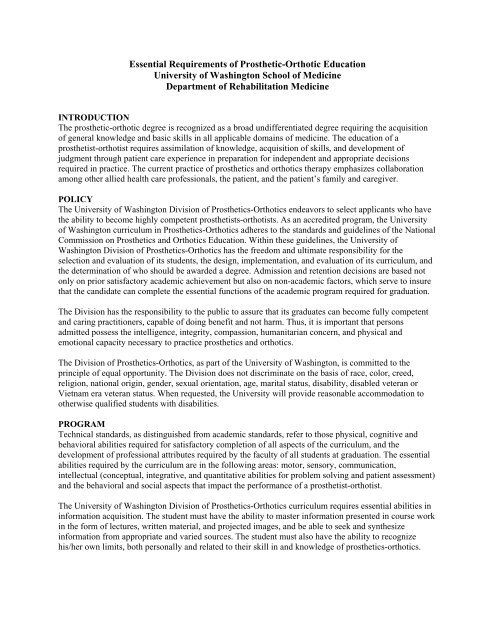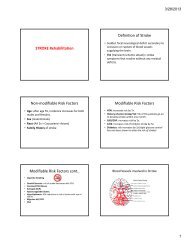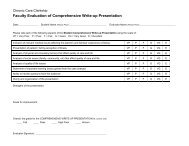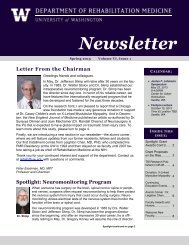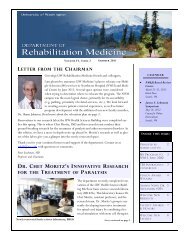Essential Requirements of Prosthetic-Orthotic Education University ...
Essential Requirements of Prosthetic-Orthotic Education University ...
Essential Requirements of Prosthetic-Orthotic Education University ...
You also want an ePaper? Increase the reach of your titles
YUMPU automatically turns print PDFs into web optimized ePapers that Google loves.
<strong>Essential</strong> <strong>Requirements</strong> <strong>of</strong> <strong>Prosthetic</strong>-<strong>Orthotic</strong> <strong>Education</strong><strong>University</strong> <strong>of</strong> Washington School <strong>of</strong> MedicineDepartment <strong>of</strong> Rehabilitation MedicineINTRODUCTIONThe prosthetic-orthotic degree is recognized as a broad undifferentiated degree requiring the acquisition<strong>of</strong> general knowledge and basic skills in all applicable domains <strong>of</strong> medicine. The education <strong>of</strong> aprosthetist-orthotist requires assimilation <strong>of</strong> knowledge, acquisition <strong>of</strong> skills, and development <strong>of</strong>judgment through patient care experience in preparation for independent and appropriate decisionsrequired in practice. The current practice <strong>of</strong> prosthetics and orthotics therapy emphasizes collaborationamong other allied health care pr<strong>of</strong>essionals, the patient, and the patient’s family and caregiver.POLICYThe <strong>University</strong> <strong>of</strong> Washington Division <strong>of</strong> <strong>Prosthetic</strong>s-<strong>Orthotic</strong>s endeavors to select applicants who havethe ability to become highly competent prosthetists-orthotists. As an accredited program, the <strong>University</strong><strong>of</strong> Washington curriculum in <strong>Prosthetic</strong>s-<strong>Orthotic</strong>s adheres to the standards and guidelines <strong>of</strong> the NationalCommission on <strong>Prosthetic</strong>s and <strong>Orthotic</strong>s <strong>Education</strong>. Within these guidelines, the <strong>University</strong> <strong>of</strong>Washington Division <strong>of</strong> <strong>Prosthetic</strong>s-<strong>Orthotic</strong>s has the freedom and ultimate responsibility for theselection and evaluation <strong>of</strong> its students, the design, implementation, and evaluation <strong>of</strong> its curriculum, andthe determination <strong>of</strong> who should be awarded a degree. Admission and retention decisions are based notonly on prior satisfactory academic achievement but also on non-academic factors, which serve to insurethat the candidate can complete the essential functions <strong>of</strong> the academic program required for graduation.The Division has the responsibility to the public to assure that its graduates can become fully competentand caring practitioners, capable <strong>of</strong> doing benefit and not harm. Thus, it is important that personsadmitted possess the intelligence, integrity, compassion, humanitarian concern, and physical andemotional capacity necessary to practice prosthetics and orthotics.The Division <strong>of</strong> <strong>Prosthetic</strong>s-<strong>Orthotic</strong>s, as part <strong>of</strong> the <strong>University</strong> <strong>of</strong> Washington, is committed to theprinciple <strong>of</strong> equal opportunity. The Division does not discriminate on the basis <strong>of</strong> race, color, creed,religion, national origin, gender, sexual orientation, age, marital status, disability, disabled veteran orVietnam era veteran status. When requested, the <strong>University</strong> will provide reasonable accommodation tootherwise qualified students with disabilities.PROGRAMTechnical standards, as distinguished from academic standards, refer to those physical, cognitive andbehavioral abilities required for satisfactory completion <strong>of</strong> all aspects <strong>of</strong> the curriculum, and thedevelopment <strong>of</strong> pr<strong>of</strong>essional attributes required by the faculty <strong>of</strong> all students at graduation. The essentialabilities required by the curriculum are in the following areas: motor, sensory, communication,intellectual (conceptual, integrative, and quantitative abilities for problem solving and patient assessment)and the behavioral and social aspects that impact the performance <strong>of</strong> a prosthetist-orthotist.The <strong>University</strong> <strong>of</strong> Washington Division <strong>of</strong> <strong>Prosthetic</strong>s-<strong>Orthotic</strong>s curriculum requires essential abilities ininformation acquisition. The student must have the ability to master information presented in course workin the form <strong>of</strong> lectures, written material, and projected images, and be able to seek and synthesizeinformation from appropriate and varied sources. The student must also have the ability to recognizehis/her own limits, both personally and related to their skill in and knowledge <strong>of</strong> prosthetics-orthotics.
The student must have the cognitive abilities necessary to master relevant content in basic science andclinical courses at a level deemed appropriate by the faculty. These skills may be described as the abilityto comprehend, memorize, analyze and synthesize material and to do so in a timely manner. He/she mustbe able to discern and comprehend dimensional and spatial relationships <strong>of</strong> structures, and be able todevelop reasoning and decision making skills appropriate to the practice <strong>of</strong> prosthetics-orthotics.The student must have the ability to take and document, in a patient’s record, an appropriate history, andperform a physical examination. Such tasks require the ability to communicate with the patient andfamily. The student must also be capable <strong>of</strong> perceiving the signs <strong>of</strong> disease, especiallyneuromusculoskeletal dysfunction, as manifested through the physical examination. Such information isderived from observation and palpation <strong>of</strong> the body surfaces. The student must have the ability to discernskin, subcutaneous masses, muscles, bones, and joints.A major component <strong>of</strong> the practice <strong>of</strong> prosthetics-orthotics is the assessment and management <strong>of</strong>movement disorders. Therefore, the student must have the ability, within reasonable limits, to safely assista patient in moving, for example, from a chair to a bed.The student must also have the ability to move him- or herself and the patient in three-dimensional spacein order to perform motor function tests. Additionally, the student must be able to ensure the physicalsafety <strong>of</strong> a patient at all times.The student must be able to communicate effectively with patients and family, physicians and othermembers <strong>of</strong> the health care team. The communication skills require the ability to assess all informationincluding the recognition <strong>of</strong> the significance <strong>of</strong> non-verbal communication, and immediate assessment <strong>of</strong>information provided to allow for appropriate, well-focused patient care. The student must be capable <strong>of</strong>responsive, empathetic listening to establish rapport in a way that promotes openness on issues <strong>of</strong> concernand sensitivity to potential cultural differences.The student must be able to understand the basis and content <strong>of</strong> ethical prosthetics-orthotics practice.He/she must possess attributes, which include compassion, empathy, altruism, integrity, responsibilityand tolerance. He/she must have the emotional stability to function effectively under stress and to adapt toan environment, which may change rapidly without warning and/or in unpredictable ways.The student must have sufficient body muscle coordination to practice safe use <strong>of</strong> hand and machine toolsnecessary for technical implementation in the fabrication process.These essential functions <strong>of</strong> prosthetic-orthotics education identify the requirements for admission,retention and graduation <strong>of</strong> applicants and students respectively at the <strong>University</strong> <strong>of</strong> Washington Division<strong>of</strong> <strong>Prosthetic</strong>s-<strong>Orthotic</strong>s. Graduates are expected to be qualified to enter the prosthetic-orthotic pr<strong>of</strong>ession.It is the responsibility <strong>of</strong> the student with disabilities to request those accommodations that he/she feelsare reasonable and are needed to execute the essential requirements described.


